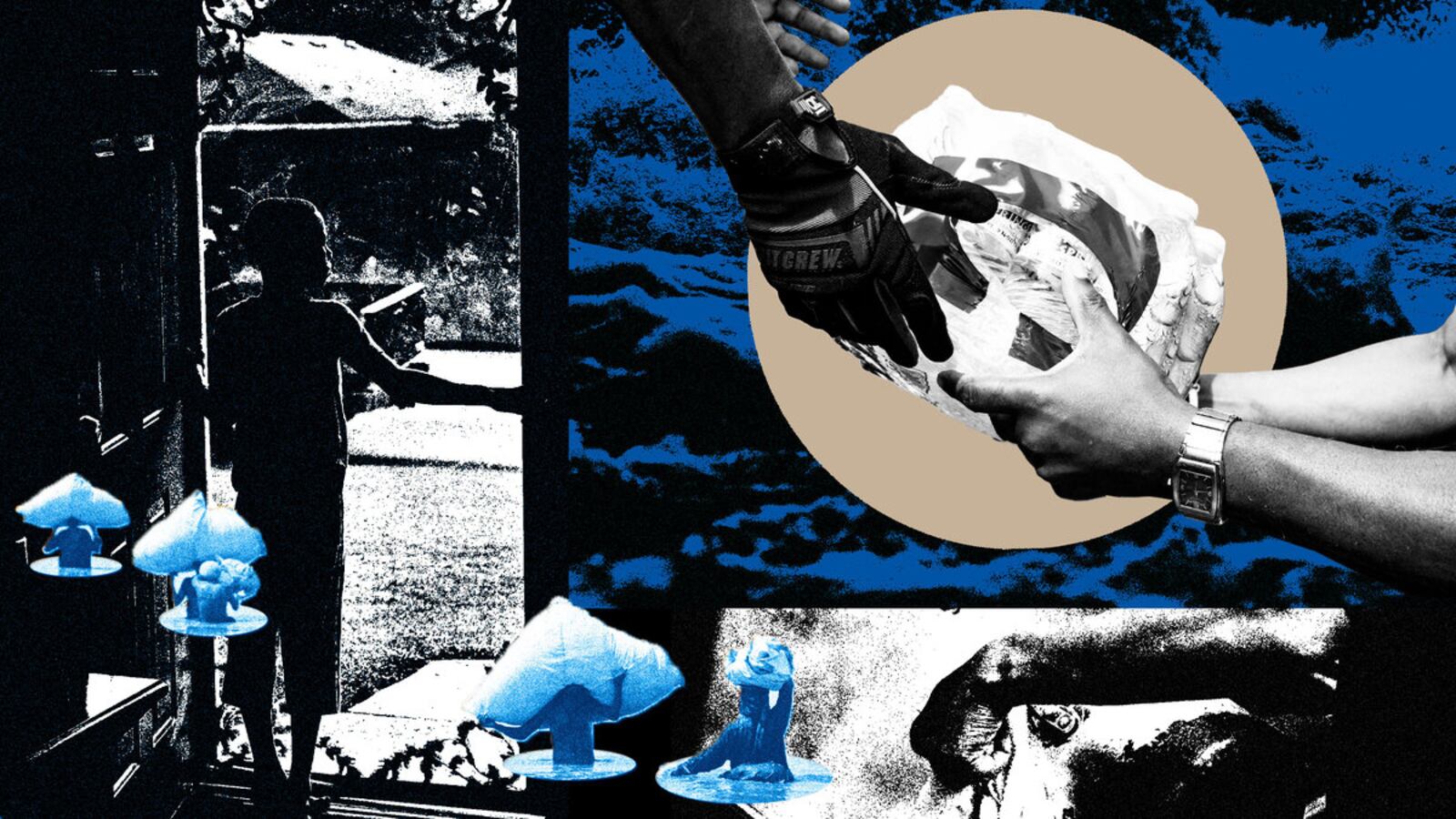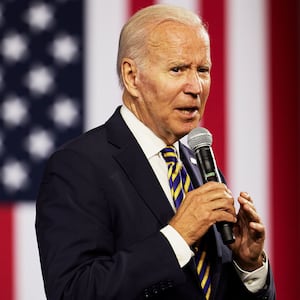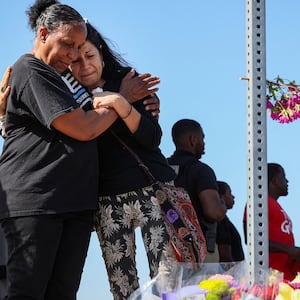Typically, when an environmental disaster hits America there is wall to wall media coverage.
If it’s a flood, we see the same images gracing our screens: houses, roads, schools, and cars underwater, once thriving neighborhoods washed away. If it’s a fire, hurricane, or tornado the coverage is similar—you talk to the locals with tears in their eyes standing in front of what used to be their neighborhoods wondering how they will rebuild. There is always the momentary outpouring of sympathy and money—if, in fact, the communities that were damaged were filled with “average Americans.”
There isn’t a Black person in America who doesn’t know that the term “average American” or “hard-working American” is a not too subtle code for white Americans—the people who enjoy an automatic empathy denied to others.
Consequently, whenever an environmental disaster occurs in a largely Black community, there is rarely a TV crew to be seen, unless of course it's to ridicule and admonish people for scouring stores (as they did during Hurricane Katrina) for supplies so they could survive.
In America, we celebrate the rich and we demonize the poor. Don’t believe it?
Look no further than the crisis that is unfolding in Jackson, Mississippi, or Flint, Michigan, plus New York City, Baltimore, et al. Heavily populated Black and brown communities are receiving government orders to boil water (or to not drink it all). What’s not following those alerts? A reprieve in water bill payments.
When we hear stories like the travesty happening in Jackson, Mississippi—with an 80-percent Black population, where an entire city no longer has access to clean drinking water, with no end in sight—there’s a brief spasm of shock and outrage in the nation’s conscience, but that fades alongside images of dilapidated buildings and neighborhoods that don’t resemble those of “average Americans.” The assumption isn’t that the people suffering are also “hard-working Americans,” it’s that they’re lazy or dangerous or otherwise deserving of poverty and substandard public works—like clean, running water.

Cases of bottled water are handed out at a Mississippi Rapid Response Coalition distribution site on August 31, 2022 in Jackson, Mississippi. Jackson is experiencing a third day without reliable water service after river flooding caused the main treatment facility to fail. Late Tuesday night, President Joe Biden declared an emergency amid the crisis.
Photo by Brad Vest/Getty ImagesThe reality is that what’s happening in Mississippi isn’t your average environmental disaster. It’s a culmination of centuries of racism, neglect, and theft.
Jackson is a city of over 160,000 residents who have dealt with underinvestment for decades. Last year the state faced one of its harshest winters, which knocked the water offline for nearly a month. The latest disaster, like previous superstorms, has caused major flooding, disintegrated roadways, and rusted brown water coming from the pipes.
In the most recent infrastructure bill that President Joe Biden fought to make a reality, hundreds of millions of dollars were earmarked for places exactly like Jackson, but sadly it’s left to state legislators to decide where that money is invested. Unsurprisingly, in a state that was one of the most vicious battlegrounds for civil rights, basic living conditions for Black taxpayers aren’t a high priority.
An auditor recently reported that Mississippi, the nation’s poorest state, spent $70 million earmarked for welfare recipients on speeches from a pro football player, a volleyball complex, a horse farm, and other ridiculous outlays. While there is currently a criminal investigation underway, we can be fairly confident that no politician will actually go to jail over this. As quickly as this story came to the spotlight is as quickly as the outrage will likely dissipate—and those welfare recipients desperate for relief will be told to wait just a little while longer.
That is how we treat the poor in America. We make economic status about “hard work” as opposed to systemic racism, discrimination, theft, and lies.

Jamiya Williams, left, watches as her fiance, Terrence Carter, right, pours bleach into the water before washing dishes in response to the water crisis on September 01, 2022 in Jackson, Mississippi. The water pressure increased in their apartment on Wednesday, however the water is still unsafe to drink.
Photo by Brad Vest/Getty ImagesEnvironmental racism is one of the most insidious forms of racism, whereby low income communities and communities of color are designated to be dead-smack in the middle of areas that aren’t fit for human existence. These include industrialized areas that are hotbeds for pollution, chemical runoff from plants, and toxic fumes. What's worse is that these areas are often in low-lying plains, meaning they will be more susceptible to superstorms (a symptom of climate change). The health consequences of living in and around these areas are devastating, and include increased risk of birth defects, cancer, and developmental issues.
This is all disgraceful, but it’s not even the worst part, which is that these decisions were made purposefully to harm Black and brown communities.
Transportation Secretary Pete Buttigieg (as well as Obama’s Transportation Secretary Anthony Foxx) have stated that racism was literally baked into the infrastructure in this country.
“If you think about it, much of this infrastructure was paid for and designed before the Voting Rights Act of 1965,” Foxx told theGrio. “That was a time before Black people were at the table.”
As the Biden administration sets out to rebuild America’s crumbling infrastructure, Secretary Buttigieg wants the country to be more equitable—in contrast to the rabid racism of Robert Moses, who in the mid-20th century built highways and overpasses specifically to keep Black people out from access to beaches and open spaces in New York.
It was in the 1980s when the term environmental racism took root, inspired by a 1983 GAO study which found that 75 percent of communities in close proximity to toxic landfills were predominantly Black. More studies have been conducted in the years since about the effects of these decisions, and how they play into life expectancy.
Think about this for a moment. We don’t just have a racial wealth gap in America, but a health gap as well, which was most recently exposed during the COVID-19 pandemic.
What COVID did was exacerbate the issues that were already plaguing Black and brown communities. While many would like to just blame the individual when it comes to poverty, the reality is far more complex. People live where they can afford to live. When you have highways and power plants that are being designed to divide highly populated Black communities, or build factories that will pollute the environment all under the guise of “job creation,” you end up where we are now—with a stark a divide not just between rich and poor, and Black and white, but also healthy and sick.

Local residents place sand bags to prepare a wall to protect population from flood waters in Mehar area after heavy monsoon rains in Dadu district, Sindh province on September 7, 2022. Record monsoon rains have caused devastating floods across Pakistan since June, killing more than 1,200 people and leaving almost a third of the country under water, affecting the lives of 33 million.
Photo by Aamir Qureshi/AFP via Getty ImagesTragically, environmental racism isn’t just happening in the U.S. We’re watching it play out on the world stage, specifically, in Pakistan. A third of the country is underwater right now because of an unprecedented monsoon season that has displaced over 30 million people and killed thousands. Most Americans are oblivious to the heartbreak taking place in this largely Muslim nation, because our mainstream media barely pays it notice. Pakistan is responsible for less than one percent of the world’s carbon emissions, and yet its people are paying for the greed of more industrialized and whiter nations—who aren’t even offering the level of monetary support this crisis deserves, let alone the attention or the empathy.
From Jackson to Pakistan, it is evident who is going to pay the price for climate change and unrelenting capitalism. And it won’t be the people who created this man-made disaster.
As Nina Simone sang so beautifully in her 1964 song “Mississippi Goddam”: “All I want is equality, for my sister, my brother, my people and me”.







